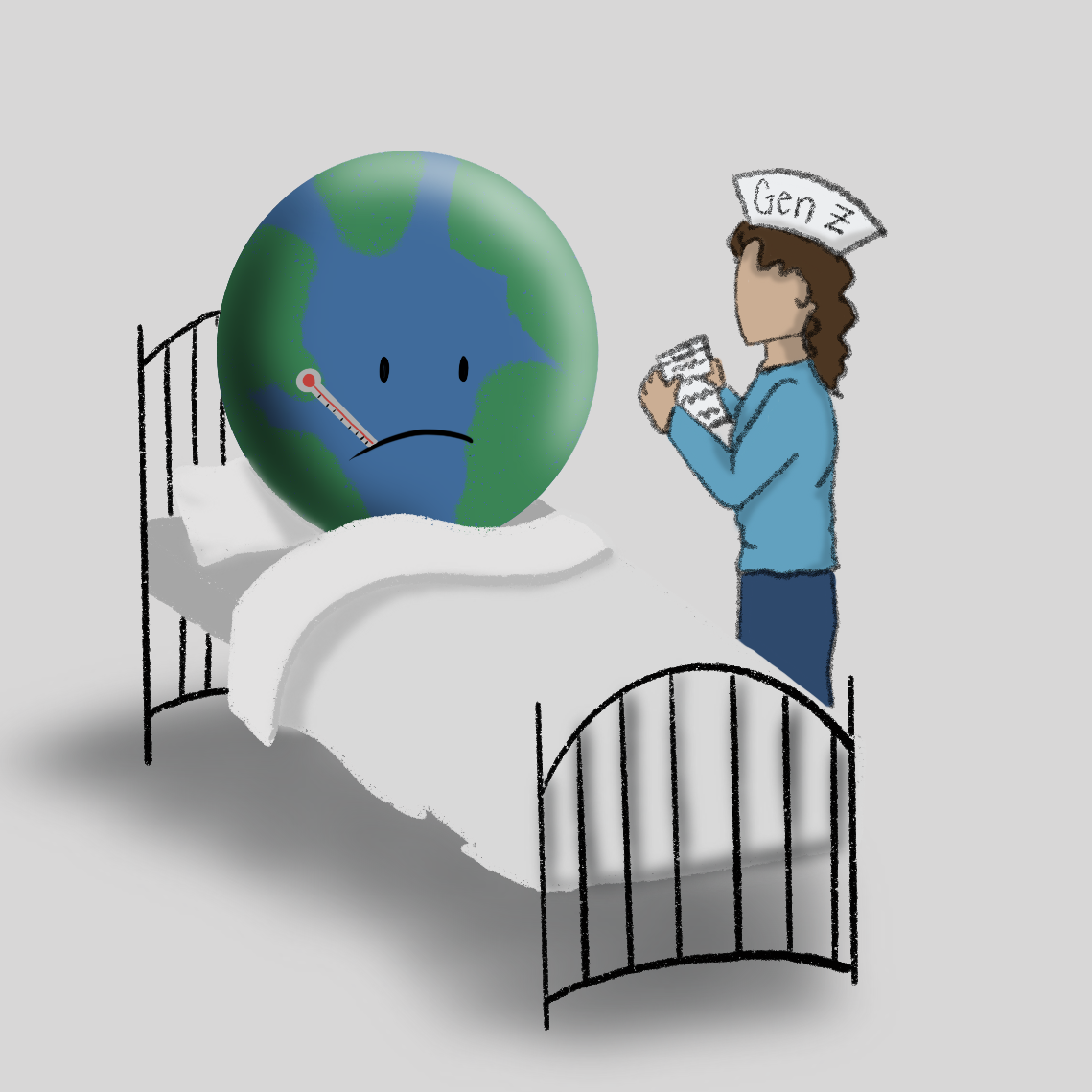I’m worried about the climate. Every couple of days, my mind becomes completely consumed with the impending doom that is sure to arrive in the next couple of years in the form of constant wildfires, unsurvivable heat and rising sea levels, to steal my supposedly carefree twenties away from me.
I stay up into the early hours of the morning, Googling some variation of “Is there hope for climate change,” and “Biden climate change plan good?” I replay images of old, stuffy men in the distance, making decisions to benefit their self-interest as they drill further and further into the ground to exploit the Earth for oil. I fret over every piece of waste I encounter, wondering whether I should trash it or wash it and hope it qualifies for the recycling bin. What if I wash the aluminum foil I heated leftover lasagna on, does it become recyclable then? The anxiety is crippling.
What’s worse is the guilt. The guilt is parasitical, feeding on a constant feeling of helplessness. Though I did not have any say in being born, nor did I have any part in presiding over the industrial revolution, I harbor the guilt of climate change like it’s a part of a shady past I’m ashamed of.
But my existence and its carbon footprint are not excused just because I don’t mean to cause environmental harm. I attend a University that has profited from fracking. I live in and, up until recently, have gladly reaped the benefits of the Global North, the group of countries that is responsible for 92 percent of excess global carbon emissions. Easy access to refrigerators and air conditioners are just a fraction of the benefits of living in a developed country, but they come at the expense of a more volatile environment.

Staff Cartoonist
Doom, doom, doom. That’s what you get if you Google “climate change” and for a good reason. I lived through California’s wildfires last summer, and I can’t seem to shake the trauma of living in a hellish orange atmosphere lasting day and night for days on end. Nor can I shake the image of ashes gathering on my car window, getting in my hair and on my clothes every time I stepped outside during that horrid couple of weeks.
Sometimes I feel as though our generation is divided into two groups – those who are passionate activists and those who are overwhelmed by the mere thought of the crisis. I’m afraid to say that I’ve been a part of the latter group, but I’m hoping to transition into the former as I continue to educate myself about ways to reduce my own carbon footprint and get involved with advocacy groups. The main drive for this transition? Googling “Climate change solutions.”
The Sunrise Movement and other young climate activist groups have championed the phrase “climate justice,” which I’m quite drawn to. The idea that we’re using the climate crisis as an impetus to change the current world order to one where we take equitable care of people around the globe and the planet sounds both appealing and exciting.
The doomsday articles are well-intentioned and needed, but I’ve learned that they aren’t really targeted toward young people and activists who will be the ones to bear the brunt of, and eventually fix, the climate crisis. They’re for the people and politicians who don’t seem to hear or want to hear the alarm that activists have been sounding for years on end. For young people, it isn’t the way that these types of articles make it seem like we’re living through the apocalypse that we need to extrapolate. It’s the facts and current state of climate change that we need to be aware of, so we can find ways to contribute to the solutions that alleviate the current crisis.
Most people feel fairly helpless in the climate crisis and reasonably so. The onus should be, and still is, on the major contributors to CO2 emissions. And as a history major, I don’t see myself in a lab trying to create new plants that absorb carbon or building an effective carbon sequestration machine. Based on my skills in biology and chemistry, the world is probably much better off for this.
Even so, it is important to remember that we all have roles to play. Journalists reporting on climate solutions are telling young people that there’s hope. Scientists are studying the climate crisis closely and are letting us know what exactly we’re currently facing and could be facing in the near future. Even if some of us don’t feel particularly trained in a career field, there are always volunteer opportunities that are doable for anybody right here in the D.C. area.
I’ve been looking to take part in GRID Alternatives, an organization that trains regular people to install solar panels. I’ve also been looking at clean-up events, like one that gives people a free canoe to ride on the Anacostia river in exchange for cleaning up some of the trash in the river.
I’m not looking to give up on the climate yet. I know there are going to be tough years ahead, but I know our generation can handle its burdens. The most important thing to remember is that we’re going to survive for, at the very least, the rest of this century, and that still means something to me. Governments around the world are getting more serious, the press can’t seem to get enough of climate reporting and those signs bode well for our engagement with climate solutions.
Shreeya Aranake, a junior majoring in history, is the contributing opinions editor.


